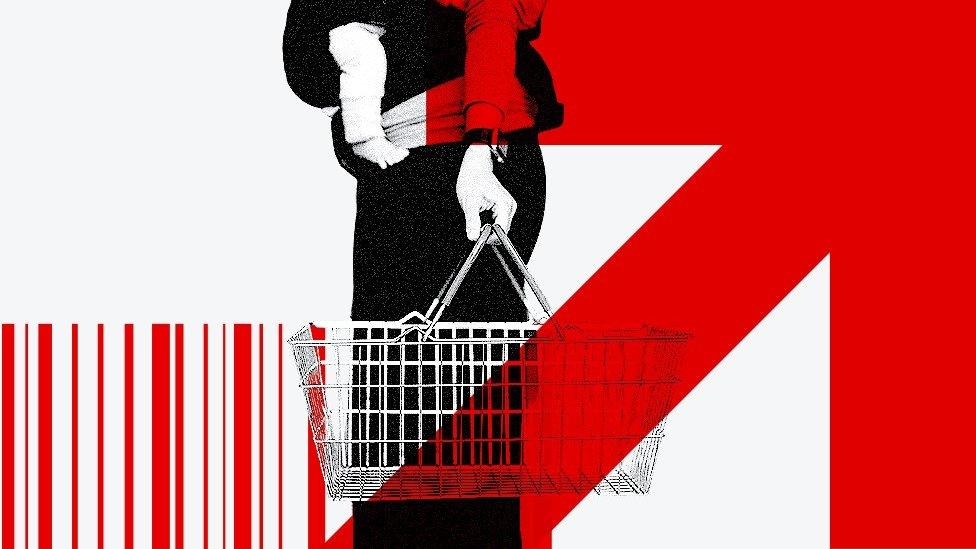How much will your Christmas dinner cost this year?
- Published
- comments
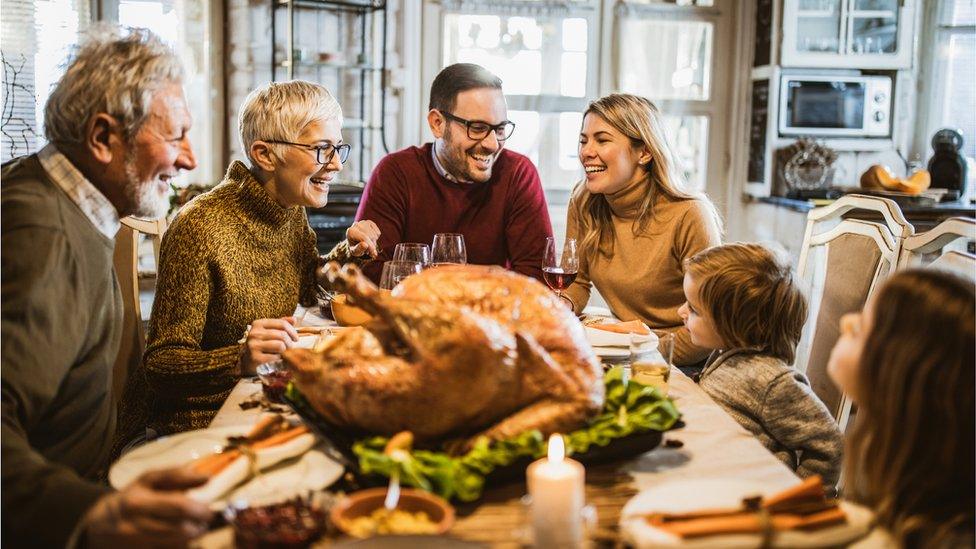
Those tucking into a traditional turkey for Christmas dinner shouldn't have to fork out much more than last year.
The price of a supermarket frozen bird has gone up by just 1.2% in a year, while fellow festive favourite the mince pie has risen by 25%.
Meanwhile, higher-end potatoes, stuffing mix and Brussels sprouts are cheaper, research for the BBC suggests.
Overall, a typical Christmas dinner costs around £32.35 this year, which is a 4.3% increase on £31 last year.
The research comes from retail tracking platform Assosia, which measured the annual change in prices for own-brand products across Tesco, Sainsbury's, Asda, Morrisons, Aldi and Lidl. It compares figures on 1 December 2023 with the same products on the same day in 2022.
Which items have gone up?
The crowning glory of the festive feast the turkey has seen its price rise by a paltry 1.2%. But last Christmas, turkey prices soared following an outbreak of avian flu which led to hundreds of thousands of birds being culled. This means turkey is still 20% more expensive than in was in 2021.
Carrots have seen the biggest price rise in our data, with a whopping 27%, with iced mince pies also seeing prices rise by a quarter.
A jar of onion gravy granules was up some 18% on last year, while Christmas pudding will cost shoppers 11% more.
Overall, the basic ingredients for the big day - turkey, stuffing, gravy, pigs in blankets, potatoes, Brussels sprouts, carrots, parsnips, Christmas pudding and mince pies - would typically cost around £32.35.
It was £31 in December last year, so there has been an increase of about 4.3%. Compared to two years ago, when it would have cost £26.58, that's an increase of nearly 21.7%.
If we swap some items with higher-end alternatives - think fresh stuffing balls and premium potatoes instead of stuffing mix and the cheaper Maris Piper - the total cost rises to around £41.76.
That is up 3.5% from last year as well, although a smaller rise than the basic list. This suggests cheaper products have seen bigger rises, which disproportionately affects budget-conscious shoppers.
Separate figures from the Office for National Statistics show that the food inflation rate, that is the rate at which all food and non-alcoholic drink prices have increased in the year to November 2023, was even higher at 9.2%.
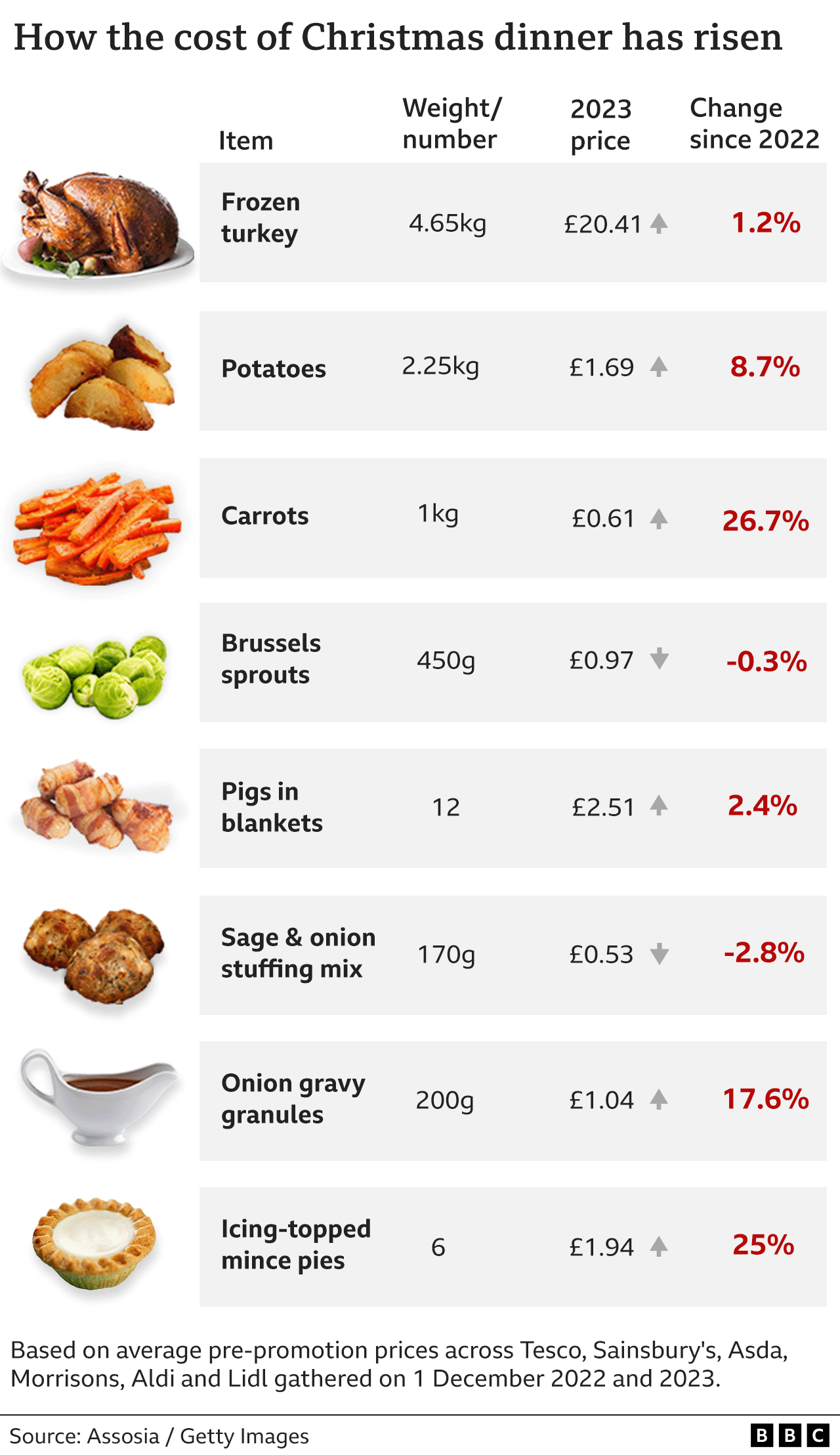
The turkey is the star of the show for many a Christmas feast and Stuart Bebbington, the owner of SJ Bebbington butcher in Chester, told us there were plenty to go around.
"There's no shortage of turkeys at all this year. We can sell sell sell. Everything just feels a bit calmer and more stable this Christmas," he said.
"It's been quite nice for us to say to the customers they're the same price as last year and I think that's been quite reassuring for people to be honest.
"I think generally people still like to push the boat out at Christmas. I think after a long year like we've had people still want to go for it at Christmas."
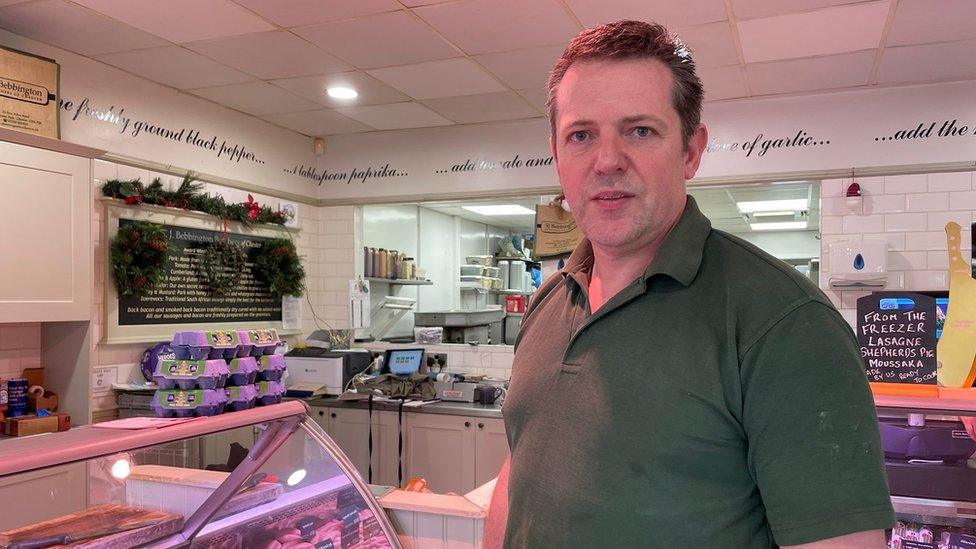
Butcher Stuart Bebbington said the price of his turkeys had not gone up
Roast potatoes are a celebrated side at the Christmas dinner table and they're nearly 9% more expensive this year.
Scott Walker, the chief executive of GB Potatoes, says: "Quite simply, we've had one of the most difficult growing seasons in decades."
At the start of the year there was not enough rain, and at the end, there were floods in many places, he said.
"The weather this year has been horrendous for the potato crop," he said.
"The whole cost of growing potatoes and getting them onto the shelves is more expensive," he added.
Higher fertiliser prices, labour costs and labour shortages have pushed costs up as well, he added.
Carrots, while still the cheapest item on the Christmas menu, have shot up in price compared with last year.
They are near 27% dearer, rising from an average of 48p per kilogram to 61p.
Rodger Hobson, chairman of the British Carrot Growers Association, said that carrot harvests had not been too badly affected by the weather, although floods at the end of the year had an impact.
This is because carrots are grown and harvested for nearly the entire year, unlike potatoes, which are harvested and stored, he said.
Instead, carrots are a "battleground for supermarkets", where they use them as a loss leader, he says.
This is where shops sell products at a loss to get people to visit stores in the hope that they will then be tempted to buy other items on which retailers can make a profit.
As to why carrots have risen so much, he says: "I suspect that's more to do with retail pricing than what supermarkets are paying farmers."
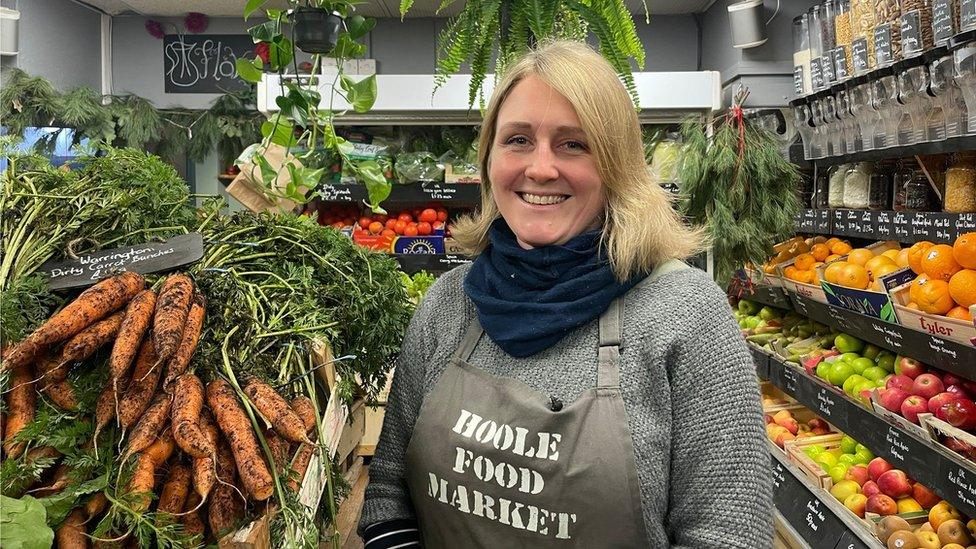
Grocer Leann Shaw said vegetable prices were affected by the weather
Leann Shaw, an independent grocer at Hoole Food Market in Chester agreed that much of price fluctuations on vegetables are down to the weather.
"Carrot prices are actually fine for us - earlier in the year they did go up in price. And it is often down to having to import them from other countries because of challenges caused by weather and storage."
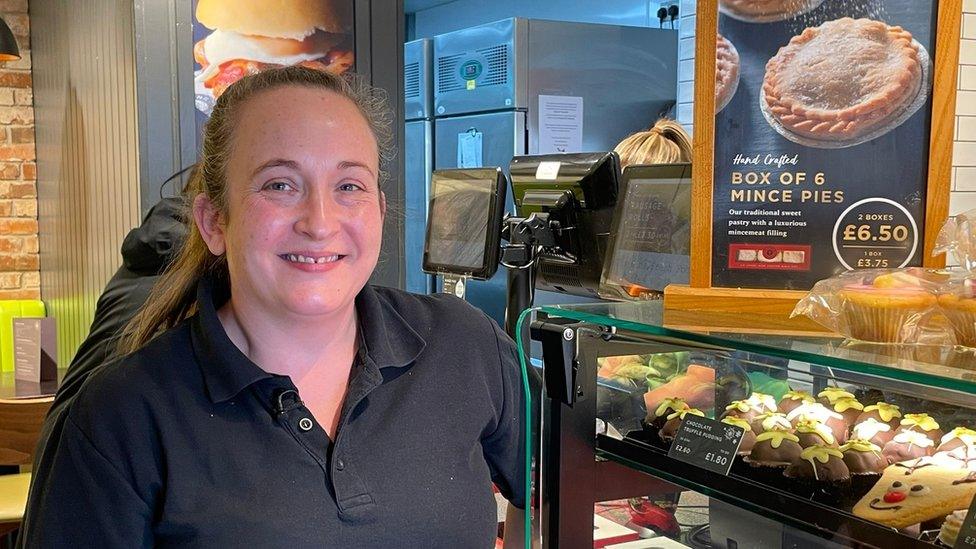
Lena Lloyd-Jones said shoppers were still stocking up on mince pies at her bakers
When you've polished off your turkey, all the trimmings, followed by Christmas pudding you might be feeling rather full - but a little while later there is often room for a mince pie.
Lena Lloyd-Jones, assistant manager, at Chatwins baker in Chester told us that despite price rises customers were not willing for forego this sweet treat.
"We have put prices up unfortunately due to the cost of ingredients," she said.
"Before people would buy mince pies plus other cakes - now they are just buying the mince pies. We do try to encourage people to buy the box of six because it's cheaper. We say if you leave them alone they will last into January - but you've got to have restraint for that!"
How do supermarkets compare?
Separate research from BBC News found that how much you pay for your Christmas dinner depends on where you shop.
We looked at prices at the top five supermarkets in the UK - Tesco, Sainsbury's, Asda, Morrisons and Aldi on the first day of December.
Our analysis shows that Aldi was the cheapest supermarket for a basic list of Christmas essentials at around £26.31.
Asda was second cheapest at £29.64, followed by Tesco and Sainsbury's. Morrisons was most expensive at £35.66.
It's a similar story with a "premium" basket of higher-end products, which would cost just over £33 at Aldi and up to £45.18 at Morrisons.
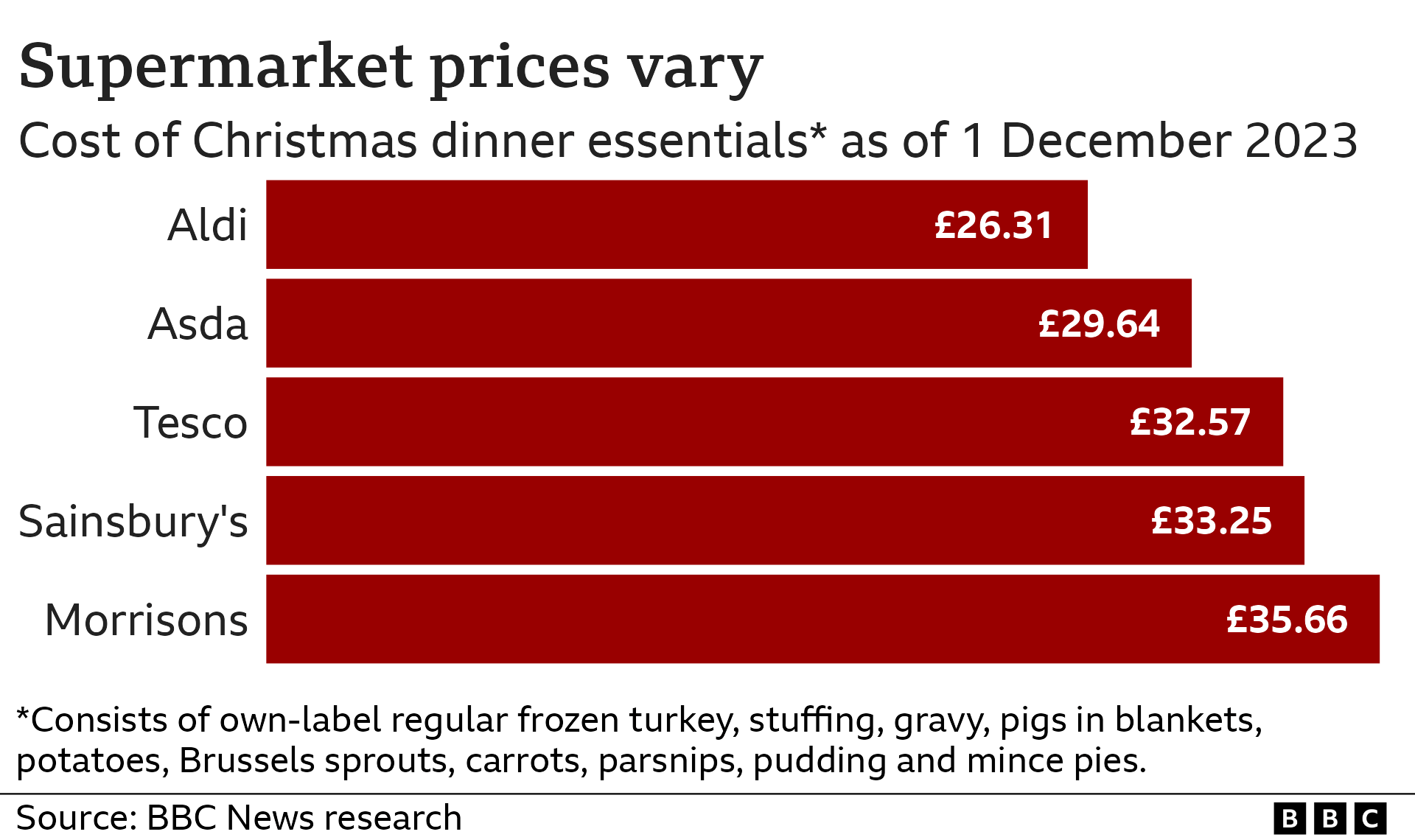
BBC News collected supermarket prices as they were listed online of 1 December 2023, matching similar products across the top five most popular supermarket chains in the UK.
While we tried to find equivalent items across all five, there are some small differences in product sizes or types, so the amount you save by choosing a cheaper supermarket might be different depending on which products you choose.
This analysis also includes a slightly different basket and shouldn't be directly compared with the price rise figures above, which were sourced from retail analysis firm Assosia.

How to save on Christmas food
Prepping for the festive season in advance not only spreads the cost but could mean big savings on food and drink:
Start with a budget: It helps to plan ahead and think carefully about hidden expenses, like the price of tin foil for roasting a turkey.
Write a food list: Once you've got a budget figured out, ask which foods are most important to you and which you might not miss. For example, you might not be willing to give up Christmas pudding, but aren't that fussed about festive biscuits.
Bargain hunt: Look out for planned offers on retailers' websites as well as for yellow sticker items which have been reduced.
Use your freezer: Christmas foods that freeze well include butter, meat joints and some cheeses like cheddar.
Join up with friends and family: This means you can buy bigger pack sizes, which are often better value.

Related topics
- Published16 December 2023

- Published29 November 2023
